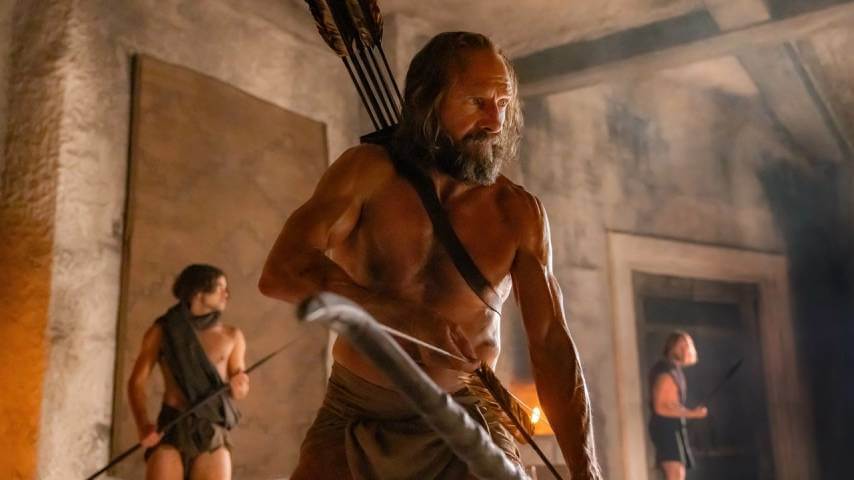A stirring Ralph Fiennes prevents The Return from being a failed Odyssey
A grimdark take on The Odyssey’s end (barely) finds its way home.
Photo: Bleecker Street
Few stories have been reimagined, relitigated, reframed, and remade as much as those from Greek myth and poetry, and of these, The Odyssey is a usual suspect. From the Coen brothers’ jailbreak flick O Brother, Where Art Thou? to James Joyce’s infamously dense Ulysses, this Homeric epic’s influence has reverberated through the ages. So, in the year 2024, how do you retell this ancient story in a novel way? If you’re director Uberto Pasolini’s film The Return, the answer is to so thoroughly suck the myth from this legend that all that’s left are the bleached bones and lingering nightmares of a senseless war fought on the other side of the Aegean Sea. Thanks to a terrific turn from Ralph Fiennes as our hollow-eyed Ithacan king, it mostly works, even if it doesn’t earn its self-seriousness.
Taking place near the end of The Odyssey, The Return finds Odysseus naked, dazed, and confused after a shipwreck. Against all odds, he’s returned to his homeland after 20 long years away. In the original Homeric hexameter, he spent 10 years laying siege in Troy and the rest of his absence being whipped around the high seas as punishment for peeving off Poseidon before being held captive by Calypso.
In this telling, it’s initially unclear where all of that time went; here, gods and mythological creatures are far from sight, if they exist at all. That likely rules out being imprisoned by a literal nymph. After hiding his identity, Odysseus finds his palace besieged by suitors vying for his wife Penelope’s (Juliette Binoche) hand, each angling for Ithaca’s throne as the island falls to ruin. Penelope has been rebuffing these men in the hope of her husband’s return, but this has alienated her son Telemachus (Charlie Plummer), who wants her to accept his father’s death so the kingdom can move on. Odysseus mulls over what to do next, unsure if he wants to intervene and if his people would even welcome him back if he did.
As can probably be surmised, this rendition is decidedly not an epic. As a young Ithacan excitedly retells the siege of Troy in the Homeric style, Odysseus shoots down these suggestions of heroics with a thousand-yard stare before giving a far more barbarous and realistic depiction of Troy’s destruction that involves a great deal of senseless butchery. This is The Odyssey filtered through modern grit and the haze of a post-Vietnam War film, presenting stark shots of an island in disrepair as Odysseus is tortured by what he’s done. Ithaca doesn’t look like a grand island of legend but a destitute place picked at by vultures. Cinematographer Marius Panduru mostly avoids sweeping camera movements in recreating Greek epic poetry and instead utilizes a narrow frame, capturing the protagonist’s creased wrinkles and scraggly beard.
This close-cropped cinematography is a great choice when focused on Fiennes, who sells The Return’s dour presentation. He oscillates between jubilation over finally being home, squeezing dirt between his fingers, and despair over what he’s lost. There’s a perpetual haunted distance to the performance that captures Odysseus’ survivor’s guilt from returning alone, and as he tenses his muscles at the suitors’ provocations, we can see he’s trying to avoid repeating the brutal acts that he deeply regrets. While the concept of a grimdark Odysseus, stripped of his mischievous guile and left only with bottled masculine rage, could have come across as overbearingly macabre, the nuance of Fiennes’ performance gives this portrayal additional depth, even if the movie’s generally morbid presentation still doesn’t always land.
That said, it certainly helps that the band of suitors who plague him are diabolical in compelling ways, and while only Marwan Kenzari’s Antinous has a similar degree of well-rounded heft, the rest of this band are viscerally despicable. There’s Tom Rhys Harries as a sociopathic Pisander, whose icy cold gaze and unpredictability add tension to every scene he’s in, and Jamie Andrews Cutler’s brutish Polybus, who kills with little recourse. They murder and steal without compunction as their nonchalant cruelty further amplifies The Return’s bleak tone while providing a worthwhile foil for our guilt-stricken king.
This all leads to the main conflict, one that makes the best use of these ruminations on PTSD and lingering wartime trauma: Odysseus is plagued by his previous acts of violence and seems reluctant to repeat them, even against the suitors destroying Ithaca. We know how The Odyssey ends, with the hero slaughtering the suitors to the last man, even killing the maids who fraternized with them, and that seemingly inevitable conclusion hangs over the film.
In The Return, Odysseus is so distraught over the Trojan War that his struggles to get back to Penelope are internal instead of external, and he’s terrified that the things he’s done have left him unrecognizable. It’s a well-explored riff on the character that comes to a head in a somewhat disturbing climax that doubles down on the general absence of heroism in this telling. Here, killing is just killing.
And yet, John Collee, Edward Bond, and Pasolini’s screenplay fails to resolve its most grandiose questions. Penelope asks her husband, “Why do men go to war?” There isn’t much answer here, and the film ends on a turn that feels entirely out of place—one that retroactively diminishes its attempted explorations on the nature of violence. But even if the ending perfectly tied everything together, the movie’s moroseness doesn’t connect, occasionally becoming tedious. While The Return only partially succeeds at reframing Homer through the lens of anti-war cinema, some excellent performances ensure it doesn’t get as lost as its central hero.
Director: Uberto Pasolini
Writers: John Collee, Edward Bond, Uberto Pasolini
Stars: Ralph Fiennes, Juliette Binoche, Charlie Plummer, Marwan Kenzari
Release Date: December 6, 2024